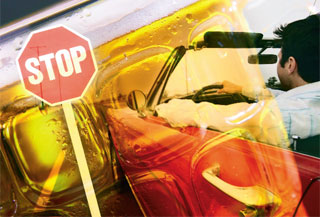|
Liquor liability
Proliferation of liquor liability laws points out need for insurance
By Phil Zinkewicz
It was in the 1980s that liquor liability laws began to emerge across the country. Mothers Against Drunk Driving (MADD) brought attention to the deaths that were the result of alcohol-related traffic accidents. Other groups that took on drunk driving as a cause célèbre were formed, and soon legislators and regulators began to pay attention. Drunk driving laws were passed in various states, and serious penalties were put into place for those who drove under the influence. Today, drunk driving is illegal in all jurisdictions within the United States.
Still, the National Highway Traffic Safety Administration (NHTSA) estimates that 17,941 people died in 2006 in “alcohol-related” collisions, representing 40% of total traffic deaths in the United States.
Bars and restaurants stand out as businesses with alcohol-related liability issues and the subsequent need for liquor liability insurance. However, if someone is hosting a wedding, a family reunion or just having a party, that person may also need the coverage. Host liquor liability provides coverage against bodily injury or property damage alleged in lawsuits by third parties injured by an intoxicated person who was served alcohol at an event hosted by a business or individual.
M. Scott Gemberling is an attorney with the Philadelphia law firm of Marshall, Dennehey, Warner, Coleman & Goggin. For nearly 30 years, he has focused a significant portion of his practice on the defense of liquor liability and excess insurance claims. Gemberling has tried more than 100 cases, many of them involving dram shop laws. In addition to his law practice, Gemberling has lectured extensively to various claims and trial lawyer associations concerning liquor liability and other topics. He serves as the national litigation coordinator for high-exposure liquor liability, professional liability and excess claims for a number of national insurance companies. He has defended liquor liability claims in a variety of jurisdictions, including Florida, New York, Massachusetts, Rhode Island, Oklahoma, Michigan, Minnesota, Georgia, South Carolina, North Carolina, New Jersey and Connecticut.
“The number of drunk driving cases to be litigated is down a bit, but not by any meaningful amount,” says Gemberling. “With all the studies that have been done in recent years about college bingeing, you would think that it would be down or at least leveling off, but that hasn’t happened. My caseload has a great many parents of young adults, 28 or 29 years of age, who get drunk and into trouble of some kind. You would think that with all the drunk driving laws and the bells and whistles that are out there, the number of cases would be down. It isn’t.”
Gemberling says that liquor liability is unique among liability cases in the courts. “There are varying degrees of outcomes when one is working a medical malpractice case or a professional liability case, but all dram shop cases are tragic,” he says. “The word ‘alcohol’ exacerbates a jury verdict four or five times. The jury gets angry. It’s not like somebody broke an arm or leg. With alcohol-related cases, usually there are multiple deaths involved. Most liability cases are driven by experts who testify, but alcohol-related cases are judged on an emotional basis.”
Continues Gemberling: “You don’t find a lot of lawyers taking on alcohol-related cases. A good many cases are not pursued or, if they are, they are not pursued well. Then, too, in so many instances where drinking is involved, lawyers take a sort of ‘what’s new’ approach. You know, this has only been ‘one more story in the Naked City.’ And then there is the financial aspect. Some states, such as Pennsylvania, do not require owners to carry liquor liability insurance, so there is no money motivation to take on a case.”
Soft market impact
As for liquor liability insurance, Gemberling says that a good many carriers are willing to write the coverage, so the market is soft. “Some companies are not willing to write the coverage on a stand-alone basis and prefer that it be included in packages,” he says. “Some companies are very good at writing the exposure, while others are not. Liquor liability can be less predictable than other lines. An insurance company can find it is winning a lot of cases, and then comes along one big one that is lost. Some states are instituting a mandatory training process for bartenders and bar owners.”
Chris Reisdorf of wholesaler TAPCO Underwriters says that he believes the difficult economy has had an effect on the liquor liability insurance market. “When revenues are down, some people decide to go without insurance. So, the supply is there, but not the demand. The market remains soft, but you can say that about other lines of insurance as well.”
Michael Maher of R.C.A. Insurance Group, a general agency and program manager that specializes in restaurant and tavern business, says he writes liquor liability only within packages. “The public awareness of the dangers of excessive drinking has become a critical issue,” Maher says. “Drinking, especially drunk driving, has morphed into a significant risk, where it wasn’t before. Liquor liability is still a situation where there is a small percentage of the population involved, but where there is repetition. Take a person’s license away for drunk driving, and he’s still going to drink and drive.” |
|
| |
 |
| |
“Most liability cases are driven by experts who testify, but alcohol-related cases are judged on an emotional basis.”
—M. Scott Gemberling
Attorney
Marshall, Dennehey, Warner,
Coleman & Goggin |
|